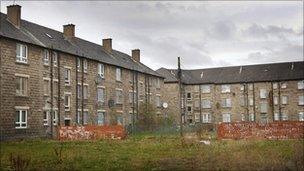Poorest Scots die 13 years early, report suggests
- Published

People living in rural areas have a longer average life expectancy than those living in urban areas
Men living in Scotland's most affluent areas are living more than 13 years longer than those in the poorest parts of the country, new figures suggest.
A report by the Registrar General for Scotland found that men in the least deprived areas can expect to live to 81.1 years on average.
By contrast, those in the poorest areas will reach just 67.7 years of age.
The discrepancy was also true for women in Scotland, although the gap was less pronounced.
Female life expectancy in the most deprived 10% of the country is nine years lower than for the least deprived 10% of the country.
Women in poorer parts of Scotland can expect to live to 75.4 years of age, but that figure rises to 84.4 for those in the most affluent communities.
The community health partnership area with the lowest life expectancy is North Glasgow - where men can expect to live to the age of 69.8 years and women can expect to live to 76.2 years.
'Most deprived'
In comparison, in the East Dunbartonshire community health partnership area - where life expectancy was highest - men can expect to live to 78.3 years of age, while for women there the figure is 83.1 years.
Men in rural areas can also expect to live almost four years longer than those living in urban areas, and women in rural areas can expect to live about two years longer than females living in large towns and cities.
Scotland's Registrar General, Duncan Macniven, said the figures showed that life expectancy "varies a great deal across Scotland".
He added: "People living in rural areas, in general, live longer than those in towns.
"And men in the least deprived areas of Scotland can expect to live 13.4 years more than those in the most deprived areas, while women in the least deprived areas can expect to live nine years more than those in the most."
A Scottish government spokeswoman said: "Health in Scotland is improving but not quickly enough and unacceptable inequalities continue to blight the lives of our most deprived communities."
She added: "The removal of health inequalities will not be achieved overnight but we have already taken significant action to address alcohol consumption, prevent people from smoking, encourage active living and healthy eating and promote positive mental health."